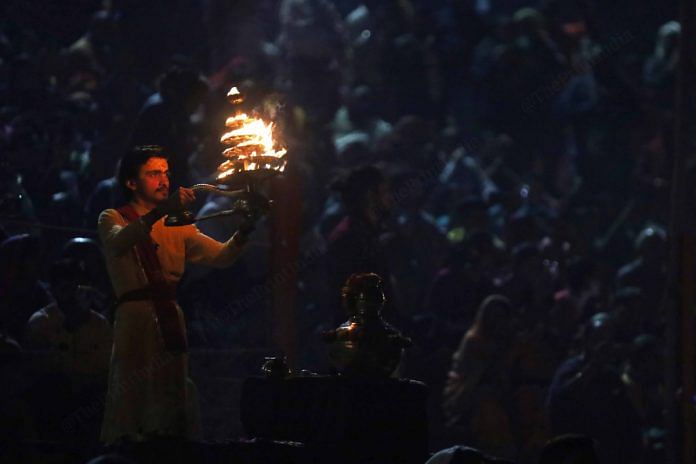Thank you dear subscribers, we are overwhelmed with your response.
Your Turn is a unique section from ThePrint featuring points of view from its subscribers. If you are a subscriber, have a point of view, please send it to us. If not, do subscribe here: https://englishdev.theprint.in/subscribe/
Back in the late 1980s, I was posted at the National Defense Academy, Khadakwasla. In those days, the TV serial “Ramayana” was screened for an hour or so every Sunday morning. During the end of a term, there are two terms in a calendar year, because of the added work schedules, the academy worked on Sundays of the last two weeks. On those Sundays, I recall, the civilian staff wanted an hour’s break between 09.30 – 11.00 AM to watch the serial Ramayana. I believe the Nation came to a “standstill” during the screening. BJP as a political force was not even on the horizon during that period. It should be no surprise then that this event “Pran Pratishtha?” in Ayodhya on 22 January 2024 and the build up to the occasion, had caught the imagination of the Nation, across political spectrum.
Most leaders of the opposition parties, for political reasons presumably, have kept away from the ceremonies at Ayodhya. In a pluralistic (BJP has only 1,385 out of the 4,120 MLAs) democracy like India, it will be a surprise only if political parties do not leverage this ostensibly religious sentiment one way or the other and what we see now are distorted views of the developments in Ayodhya. The two basic divides in a democracy are pro and anti-establishment. Usually, the ruling dispensation is the establishment and the opposition is the anti-establishment. It is really for the first time that a party other than INC, the BJP raised in the shadow of an RSS swadeshi ideology, came to power on its own and has been governing India since a decade. Here one can discern a different facet of democracy than practiced by the INC. This reversal of established norms, post the temple inauguration, is essential for perpetuating democracy. The larger implication of construction of the temple is not only a religious one. It is definitely a social issue and politics at its zenith where the players are more than one political party.
Unfortunately, democracy is a chaotic process where it is always a fight to find a balance between oligarchy, majoritarianism, dictatorship, socialism, cronyism, sectarianism, appeasement, corruption (political self-aggrandizement) et al. Take for instance; as a political party DMK is no different from the BJP. DMK thrives on a platform of ethnic Dravidian identity while the BJP is rejuvenating the Bhartiya identity. Both are perceived to have alienated a part of their respective electorate. Both are good administrators – Chess Olympiad of 2022 and recent global investors meet in Chennai, conducted by DMK government were as splendorous and efficient as the G20 functions organized by the BJP government. Yet the opposition alliance woos DMK while decrying BJP. Even the Western media overlook this similarity.
In a pluralistic (BJP has only 1,385 out of the 4,120 MLAs) democracy like India, it will be a surprise only if political parties do not leverage sentiments among the electorate one way or the other for political gains. The outward fervor and jingoism may be really eclipsing Nationalism in a polity, which has seen many ups and downs in the last more than 100 years during and after its quest for freedom from bondage.
The Economist magazine in it edition of 18 January 2024, says Narendra Modi’s illiberalism may imperil India’s economic progress (economist.com) , “To the alarm of India’s 200m Muslims, and many secular-minded Indians, it will mark a high point of a decades long-Hindu-nationalist-project”. The concerns expressed in this and similar views especially in the West are misplaced to say the least. The Western psychology tends to be binary. Binary is a reality only in the world of computers. In real life, there can exist in harmony a mix and match of kaleidoscopic experiences. In a democracy like India there is always a place for pluralistic nationalism. Nationalism need not always be like in Hitler’s Third Reich. Since the days of trade between the Indus Valley civilization nearly 5000 years ago, or even before that, with Central and West Asia, India has developed into a pluralistic society. It has, over centuries, imbibed facets from various cultures including different languages and Indians have learned to live with them.
Tailpiece: The ruling dispensation post Independence ignored calls for revitalizing the merits from the ancient times which is not in the idol but in the ideals and ideas. That this is happening now, under a different establishment which is not under the colonial cloud, is only to be expected. Rest assured that the pluralist demography and the diverse culture of India will remain forever, even under a wrongly perceived “narrow” Hindutva ideology. The flourishing of different cultures ingrained in the Indian society, is testimony to the inclusiveness practiced for centuries. Rest assured Nationalism can coexist with a pluralistic society in India. The West or East has to accept this reality.
These pieces are being published as they have been received – they have not been edited/fact-checked by ThePrint.


